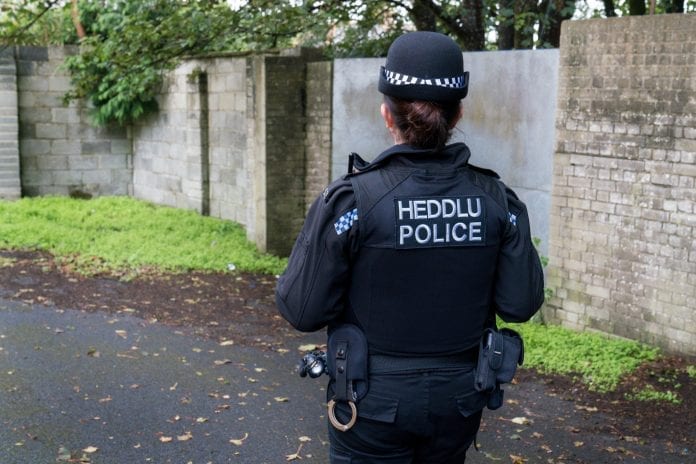- Op Tutelage – a national policing initiative where drivers who appear to have no motor insurance are sent advisory letters – has encouraged over 150,000 motorists across the UK to drive insured since being introduced in January 2020.
- In Wales over 5,600 advisory letters have been issued.
- The initiative uses a nudge approach to positively influence decision making. Around 3 in 4 recipients have been successfully encouraged to make sure their vehicle becomes insured.
- Op Tutelage helps roads policing focus resources on the remaining dangerous drivers who intentionally drive without insurance – making roads safer and fairer for all.
Op Tutelage – a national policing initiative where police forces issue advisory letters to drivers that appear to have no motor insurance – has encouraged over 150,000 motorists across the UK to drive insured.
The initiative which is led by the NPCC’s National Roads Policing Operations, Intelligence and Investigation (NRPOII) and supported by the Motor Insurers’ Bureau (MIB), was introduced in January 2020 to help reduce uninsured driving levels across the UK.
By using MIB’s Motor Insurance Database (MID) – a central record of all active motor insurance policies in the UK – police forces can quickly identify any vehicle that appears not to have insurance and send the registered keeper an advisory letter.
Results have been highly successful with 151,464 drivers correcting their insurance status to date following over 215,000 advisory letters issued thus far, which equates to around 3 in 4 people.
In Wales alone 5,676 advisory letters have been issued so far.
Op Tutelage’s advisory letters were developed alongside Dr Helen Wells, a criminologist and roads policing expert from Keele University and Director of the Roads Policing Academic Network. By drawing on research into the use of nudges, behaviour change approaches and the concept of procedural justice, the letters encourage motorists to take corrective action and drive insured.
There are a range of reasons why someone’s vehicle might show as uninsured on the MID. Causes stem from the unintentional such as drivers not realising their policy has expired or admin errors, all the way through to those willing to break the law by intentionally driving without insurance.
By sending out advisory letters, police forces want to give a chance to those who may have not realised their vehicle was uninsured to correct this before heading out on the road. Roads policing officers are then more likely to stop motorists who intentionally drive without insurance, who are linked to a higher rate of collisions and additional road traffic offences.
With all the UK’s 45 police forces having now signed up to Op Tutelage, the results have continued to grow per month. August alone saw more than 10,000 drivers nationally go from uninsured to insured.
Ben Fletcher, Chief Customer Officer at MIB, said:
“Op Tutelage is delivering outstanding results. By utilising MID data and behavioural change approaches, we can encourage most drivers who are not correctly insured to positively act. This means roads policing can focus more of their resources on the minority of motorists who deliberately break the law and put road users at greater risk.
“With traffic returning to pre-pandemic levels the last thing anyone needs is to be impacted by uninsured motorists. I’m very pleased to say that Op Tutelage is helping to make roads safer and fairer for everyone. I look forward to seeing the great results of MIB’s partnership with NRPOII as we continue to drive down uninsured driving levels.”
Dr Helen Wells, Criminologist at Keele University and Director of the Roads Policing Academic Network, said:
“Some people who drive without insurance do so by mistake, but others do it on purpose, and Op Tutelage helps the police focus their resources on those drivers that really need taking off the road. Feedback shows that the public think this is a fair and legitimate way to police the roads and that the police value the extra intelligence it gives them.”
Derek Roberts, National Programme Lead at NRPOII, said:
“Operation Tutelage has proven to be extremely effective in supporting our continuous efforts to tackle uninsured driving and improve the safety of our roads. I’d like to thank the significant majority who’ve taken appropriate action after receiving a letter and have taken the right steps to drive insured. This allows frontline policing to focus its resources on addressing the minority of drivers who intentionally drive uninsured and has helped to take some really dangerous offenders off the roads.
“If anyone wants to check that their vehicle is appearing as insured on systems we use, they can do so for free at www.askMID.com.”
Alongside Op Tutelage, MIB works with police on a range of initiatives to tackle uninsured driving.
Roads police can access the MID to check if a vehicle appears to be uninsured. If disputed by the driver, the officer can contact MIB’s Police Helpline whose Agents liaise with insurers in real-time to confirm if valid insurance exists.
Driving without insurance can result in a £300 fixed penalty notice, six licence points and the driver’s vehicle can be seized and crushed. In addition, uninsured drivers can face court where they could receive an unlimited fine and a driving ban.
Over 148,000 vehicles were seized for no insurance across the UK in 2020, at a rate of one every four minutes.
MIB is encouraging motorists to check that their vehicle is showing as insured on the MID which can be done for free at www.askMID.co.uk
Help keep news FREE for our readers
Supporting your local community newspaper/online news outlet is crucial now more than ever. If you believe in independent journalism, then consider making a valuable contribution by making a one-time or monthly donation. We operate in rural areas where providing unbiased news can be challenging. Read More About Supporting The West Wales Chronicle























